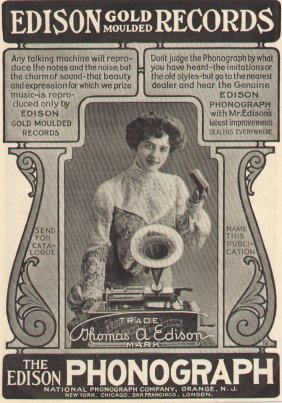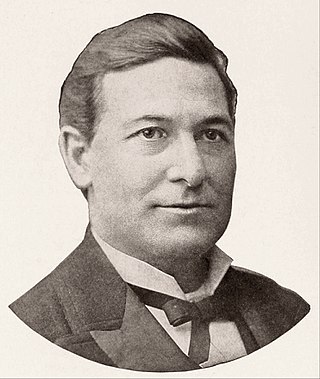Related Research Articles

Phonograph cylinders are the earliest commercial medium for recording and reproducing sound. Commonly known simply as "records" in their heyday, a name which has been passed on to their disc-shaped successor, these hollow cylindrical objects have an audio recording engraved on the outside surface which can be reproduced when they are played on a mechanical cylinder phonograph. The first cylinders were wrapped with tin foil but the improved version made of wax was created a decade later, after which they were commercialized. In the 1910s, the competing disc record system triumphed in the marketplace to become the dominant commercial audio medium.

The Victor Talking Machine Company was an American recording company and phonograph manufacturer, incorporated in 1901. Victor was an independent enterprise until 1929 when it was purchased by the Radio Corporation of America (RCA) and became the RCA Victor Division of the Radio Corporation of America until late 1968, when it was renamed RCA Records.

Edison Records was one of the early record labels that pioneered sound recording and reproduction, and was an important and successful company in the early recording industry.

Blue Amberol Records was the trademark name for cylinder records manufactured by Thomas A. Edison, Inc. in the US from 1912 to 1929. They replaced the 4-minute black wax Amberol cylinders introduced in 1908, which had replaced the 2-minute wax cylinders that had been the standard format since the late 1880s. Blue Amberols can play for as long as 4 minutes and 45 seconds and have a surface layer of the "indestructible" plastic celluloid, which Edison tinted a trademark blue color. Edison brand phonographs designed to play Amberol cylinders were named Amberolas.

"The Teddy Bears' Picnic" is a song consisting of a melody written in 1907 by American composer John Walter Bratton, and lyrics added in 1932 by Irish songwriter Jimmy Kennedy. It remains popular in Ireland and the United Kingdom as a children's song, having been recorded by numerous artists over the decades. Kennedy lived at Staplegrove Elm and is buried in Staplegrove Church, in Taunton, Somerset, England. Local folklore has it that the small wooded area between the church and Staplegrove Scout Hut was the inspiration for his lyrics.

Arthur Francis Collins was an American baritone who was one of the pioneer recording artists, regarded in his day as "King of the Ragtime Singers".

Byron George Harlan was an American singer from Kansas, a comic minstrel singer and balladeer who often recorded with Arthur Collins. The two together were often billed as "Collins & Harlan".

Sound recording and reproduction is the electrical, mechanical, electronic, or digital inscription and re-creation of sound waves, such as spoken voice, singing, instrumental music, or sound effects. The two main classes of sound recording technology are analog recording and digital recording.

Ada Jane Jones was an English-American popular singer who made her first recordings in 1893 on Edison cylinders. She is among the earliest female singers to be recorded.
"Hesitation Blues" is a popular song adapted from a traditional tune. One version was published by Billy Smythe, Scott Middleton, and Art Gillham. Another was published by W.C. Handy as "Hesitating Blues". Because the tune is traditional, many artists have taken credit as writer, frequently adapting the lyrics of one of the two published versions. Adaptations of the lyrics vary widely, though typically the refrain is recognizably consistent. The song is a jug band standard and is also played as blues and sometimes as Western swing. It is cataloged as Roud Folk Song Index No. 11765. Composer William Grant Still arranged a version of the song in 1916 while working with Handy.
The Cylinder Audio Archive is a free digital collection maintained by the University of California, Santa Barbara Library with streaming and downloadable versions of over 10,000 phonograph cylinders manufactured between 1893 and the mid-1920s. The Archive began in November 2003 as the successor of the earlier Cylinder Preservation and Digitization Pilot Project.

Cal Stewart was an American comedian and humorist who pioneered in vaudeville and early sound recordings. He is best remembered for his comic monologues in which he played "Uncle Josh Weathersby", a resident of a mythical New England farming town called "Pumpkin Center" or "Punkin Center".

Daniel William Quinn was an American tenor. He was one of the first American singers to become popular in the new medium of recorded music. Quinn was a very successful recording artist whose career spanned from 1892 to 1918. Quinn recorded many of his hits in the legendary Tin Pan Alley of New York City.

Monroe Silver was an American actor and singer who was also a comedian and monologist using a Jewish dialect-accent in his performances.

John Scantlebury Macdonald was a Canadian-born singer and recording executive. Under the pseudonym Harry Macdonough, he was one of the most prolific and popular tenors during the formative years of the recording industry. His most popular recordings included “Shine On, Harvest Moon”, “Down By The Old Mill Stream”, “They Didn’t Believe Me”, “Tell Me, Pretty Maiden”, and “Where The River Shannon Flows”.
"Cool Water" is a song written in 1936 by Bob Nolan. It is about a parched man and his mule traveling a wasteland tormented by mirages. Members of the Western Writers of America chose it as No. 3 on the Top 100 Western songs of all time.

Joseph Natus was an American minstrel performer and recording artist who was prominent during the early 20th century. He was a tenor.
The Discography of American Historical Recordings (DAHR) is a database catalog of master recordings made by American record companies during the 78rpm era. The 78rpm era was the time period in which any flat disc records were being played at a speed of 78 revolutions per minute. The DAHR provides some of these original recordings, free of charge, via audio streaming, along with access to the production catalogs of those same companies. DAHR is part of the American Discography Project (ADP), and is funded and operated in partnership by the University of California, Santa Barbara, the National Endowment for the Humanities, and the Packard Humanities Institute.
George Wilton Ballard was an American tenor and pioneer recording artist who was prolific between 1912 and 1926.

Joe Hayman was an American vaudeville comedian who also worked in British music halls, on radio and in films.
References
- ↑ "FAU Judaica Sound Archives – 78-rpm List (Jewish Music)". Faujsa.fau.edu. 1913-07-05. Archived from the original on 2012-03-13. Retrieved 2012-01-10.
- ↑ Maslon, Laurence; Kantor, Michael (2008). Make 'Em Laugh: The Funny Business of America (1st ed.). Twelve. ISBN 978-0446505314 . Retrieved July 1, 2020.
- ↑ Murrells, Joseph (1978). The Book of Golden Discs (2nd ed.). Barrie and Jenkins. p. 10. ISBN 9780214204807.
- ↑ "Cohen at the telephone / George Thompson. Edison Blue Amberol: 2815 [1916]| Cylinder Preservation and Digitization Project". Cylinders.library.ucsb.edu. 2005-11-16. Retrieved 2012-01-10.
- ↑ "FAU Judaica Sound Archives – 78-rpm List (Jewish Music)". Faujsa.fau.edu. 1927-08-11. Archived from the original on 2011-07-26. Retrieved 2011-05-28.
- ↑ "Victor Discography: Matrix B-17337. Cohen at the telephone / Barney Bernard". Victor.library.ucsb.edu. 1916-03-17. Retrieved 2012-01-10.
- ↑ SilentEra entry
- ↑ IMDB entry